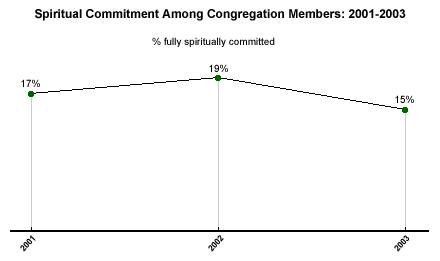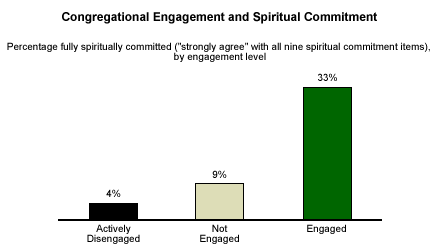In 2001, Gallup launched a major initiative designed to track important dynamics among faith communities in the United States. The research is analogous in many ways to the organizational analysis we conduct for other major social institutions, including businesses, governments, and schools. In each case, the goal is to ensure that the organization is continually improving the degree to which it meets the emotional and practical needs of its constituents, keeping them productive and happy.
In the case of religious congregations, Gallup tracks two key indicators of fulfillment among members: congregational engagement, which gauges the degree to which members feel actively involved in the congregation, and spiritual commitment, which addresses members’ personal depth of faith as manifested in their attitudes and behaviors.
Gallup’s 2003 data for each measure have just been released. As was the case with congregational engagement (see "Congregational Engagement Stable Amid Turmoil" in Related Items), the percentage of fully spiritually committed members nationwide has held relatively steady overall since Gallup began measuring it in 2001, although the overall indexed average has declined slightly since last year. Fifteen percent of adult members of congregations in the United States are "fully spiritually committed." Nineteen percent of congregation members were fully spiritually committed in 2002, and in 2001, the percentage was 17%.

Congregation members who are fully spiritually committed gave a response of "strongly agree" to each of the nine items that Gallup has determined best measure spiritual commitment, regardless of faith tradition. The nine items that measure spiritual commitment are:
- I spend time in worship or prayer every day.
- My faith is involved in every aspect of my life.
- Because of my faith, I have forgiven people who have hurt me deeply.
- Because of my faith, I have meaning and purpose in my life.
- My faith has called me to develop my given strengths.
- I will take unpopular stands to defend my faith.
- My faith gives me an inner peace.
- I speak words of kindness to those in need of encouragement.
- I am a person who is spiritually committed.
Copyright © 2001 The Gallup Organization, Princeton, NJ. All rights reserved
A closer look at each of the nine items indicates that the percentages of "strongly agree" responses to each item are also little changed. In 2001, for example, 66% of members of faith communities strongly agreed that their faith gave them an inner peace; that percentage remained at 66% in 2002 and was 68% in 2003. In 2001 and 2002, 44% strongly agreed that their faith was involved in every aspect of their lives, and in 2003, that figure grew to 48%.
Engaged Members Are More Spiritually Committed
As it has in past years, the 2003 results show that an individual’s level of congregational engagement is a significant factor in his or her likelihood to be spiritually committed. Thirty-three percent of engaged congregation members are also fully spiritually committed, compared with 9% of members who are not engaged and 4% of actively disengaged members.

Bottom Line
Is the slight downward turn in spiritual commitment a one-time dip in members’ attitudes and behaviors? Or were the 2002 results, which showed a very slight increase from 2001, a temporary spike? It’s too soon to tell, but the 2004 data, which will be collected near the end of this year, will give a better indication of where spiritual commitment trends in this country are heading.
Congregational engagement plays an important role increasing spiritual commitment. The fact that engaged members are more than twice as likely to be spiritually committed is an established trend, and sets a clear objective for spiritual leaders who seek to deepen their members’ commitment levels: Focus on developing action plans that will heighten members’ engagement in their faith communities.
*Data based on telephone interviews with 1,000 adult members of a church, synagogue, or other religious faith community, aged 18 and older, and 500 nonmembers, conducted in October and November 2003. For results based on this sample, one can say with 95% confidence that the margin of sampling error is ±2.6 percentage points.